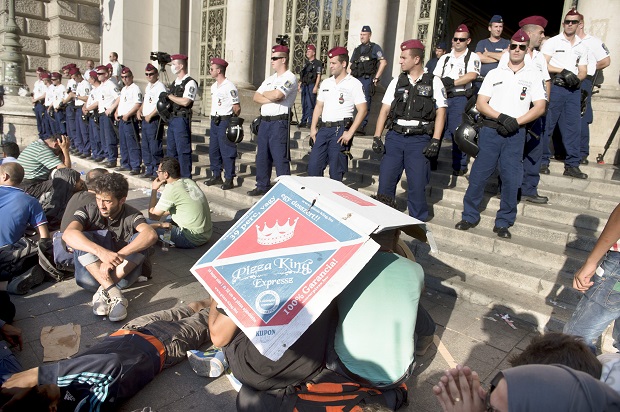Europe in new migrant standoff as figures show scale of crisis

Migrants gather to demonstrate outside the closed Eastern Railway Station in Budapest, Hungary, Tuesday Sept. 1, 2015, after they were not allowed to get on trains bound for Germany without valid documents. AP
BUDAPEST, Hungary—Hundreds of migrants demanding to travel to Germany faced off with police outside Budapest’s main railway station late Tuesday, as new figures highlighted the unprecedented scale of Europe’s refugee crisis.
More than 350,000 people, many from war-torn Syria, have made the perilous crossing of the Mediterranean so far this year, the International Organization for Migration (IOM) said.
Police cleared and briefly shut Budapest’s Keleti station a day after thousands of migrants boarded trains for Germany and Austria.
As night fell, around 500 mainly Syrian migrants, still blocked from the station entrance by a police line, chanted “Germany! Germany! Hungary, let us go!”
Some held improvised placards from cardboard boxes calling for the UN to step in, while a protestor hoisted on another’s shoulders held up a Germany football shirt to cheers.
Article continues after this advertisementThe police continued to hold back, though, and by midnight the tension had eased, with most of the migrants retreating to a nearby makeshift refugee shelter to sleep, many vowing to return to the station entrance in the morning.
Article continues after this advertisement“What else can I do,” Ahmad Orabi, a 25 year-old Syrian from Homs, told AFP. “I’ve come so far, I can’t give up now.”
Hungarian railway authorities said earlier they would allow “only those in possession of the appropriate travel documents and—if necessary—a visa” to board trains traveling to western Europe.
In a statement posted on their website, the Hungarian police said they would “continue to carry out (their) duties in accordance with the Schengen rules on border control.”
The ban was enforced just 24 hours after police had unexpectedly allowed people stuck for days in camps to leave Budapest, with hundreds surging onto trains bound for Germany and Austria, despite many not having EU visas.
This saw the highest number of migrants entering Austria in a single day this year, with police saying 3,650 arrived in Vienna by train on Monday.
Many continued on to Germany, which last week eased asylum restrictions for Syrian refugees.
German police said a record 3,500 asylum-seekers had turned up in Bavaria on Tuesday. Sweden also said the number of asylum requests there was nearing historic levels.
Record influx
The latest flashpoint, one of several recent standoffs at borders and transport hubs across the continent, came as the IOM published new figures revealing the scale of Europe’s biggest migrant crisis since World War II.
Out of the 350,000 arrivals by sea so far this year, 234,770 alone were in Greece, it said.
That figure by itself is more than the entire Europe-wide total for all of 2014.
At least 2,600 died trying to reach Europe, either by drowning or suffocating in packed or unseaworthy boats, the agency said.
Stories of refugees dying in horrific conditions crammed inside lorries have piled the pressure on the EU, which has scheduled emergency talks for September 14.
The influx is Europe’s “greatest challenge,” Spanish Prime Minister Mariano Rajoy said Tuesday during talks in Berlin with German Chancellor Angela Merkel.
Within the EU, the crisis has stoked friction over burden-sharing—about help for “frontline” nations where the migrants arrive by sea or land, and about sharing out the numbers who are granted asylum.
Much-flouted EU rules, known as the Dublin regulation, say refugees should be processed in the first country they reach.
But the human tide is so great that this system is now badly under strain.
Hungary, where 50,000 migrants arrived in August, insists it cannot cope and has built a razor-wire fence along its border with Serbia.
France has slammed the fence as “scandalous” while Austria has accused Hungary of being “sloppy” in applying the Dublin rules. The Hungarian government has summoned the ambassadors of both countries to explain the remarks.
In Slovakia, meanwhile, police stopped several hundred far-right protestors from entering the village of Gabcikovo, south of Bratislava, which is due to host around 500 migrants after a deal with their current host Austria.
Another anti-migrant protest took place in the city of Trnava, northwest of the capital.
READ: Up to 50 dead in Austria truck as migrant crisis rages
The migrants’ plight was brought sharply into focus last week after 71 people, including four children, were found dead in an abandoned truck on an Austrian motorway near the Hungarian border. Police in Hungary and Bulgaria have made six arrests.
Austrian police said on Tuesday they had rescued 24 young Afghan migrants crammed inside a van that was like a “prison cell on wheels.”
“The car was carrying 24 Afghan minors, most aged around 16 or 17. They had been packed into this dangerous vehicle like objects, crammed on top of each other into a very small space,” a spokesman told AFP.
The EU’s Frontex border agency said a brisk trade in fake Syrian passports had emerged, mostly in Turkey.
“They know Syrians get the right to asylum in the European Union,” Fabrice Leggeri told French radio station Europe 1.
RELATED STORIES
Migrants dash for last train to Germany from bottleneck Budapest